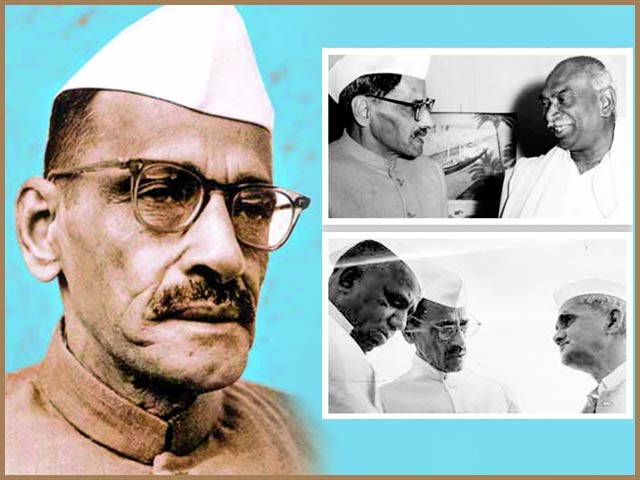Our poets have openly admitted their destitution, Ghalib says:
A few pictures tell a few letters of Hussain
After death, this material came out of the dead house
And Jonah Elijah confesses:
Do you want to decorate my room?
Nothing but books in my room
By the way, we are well aware of the lives of many famous politicians and poets of other languages of our country that if they wanted, they could have achieved a lot for themselves and their children, but their ideas and principles. But he never made a compromise due to which he spent his life in great pain, suffering and difficulties. He was one of such personalities.
What was wrong with a ninety-year-old weak, thin, helpless and helpless man who had neither earned nor acquired anything in his youth, nor was he now able to earn anything for himself. Now his age and poor health did not allow him to do so.
He had neither a private house of his own to hide his head in, nor cupboards full of precious vessels for food and drink.
In this situation, where did this poor old man get money from, he was neither a beggar, nor had any heirs, nor did he have property, pension, or bank balance, which he owned. He would rent the house on a fixed date every month. Finally, it reached a point where it became obligatory for him to pay the full five months’ rent.
On the first day of every month, he would say, “I will give you next month,” and five months passed in waiting for the next month. Finally, one day, the landlord came to collect his rent in great anger, and said, “Same are the conditions of the fakirs.” Seeing the scene, he threw all the belongings of this old man out of the house. What was the equipment?
The old man had an old bed, some old aluminum utensils, a plastic bucket and a mug etc.
The old man was sitting on the footpath with a picture of helplessness and helplessness. This is a true story of a typical neighborhood in Ahmedabad, India. The locals went to the house owner together. Begged and begged the landlord to allow the old man to stay in the house, as he had no heir.
We beg you that this man will pay his entire rent in two months by borrowing from somewhere. People from the whole neighborhood had gathered and were begging the owner of the house. Meanwhile, a newspaper reporter happened to be passing by.
Seeing this spectacle, he felt very sorry for this thin and helpless man. Take pictures of all the matter and spectacle. On reaching the office, he went to his editor’s room and told him the whole story, how today a crippled old man was evicted from his house and then the villagers intervened and took two months. The reporter placed those pictures on the editor’s desk.
As soon as the editor’s eyes fell on the pictures of the elderly man, he was shocked. He asked the reporter, do you know this person? The reporter laughed, wondering what unusual quality this old man had that would make anyone notice or notice him. Even the locals don’t know it. Eats one meal at a time.
The dish also washes itself. Even if he asks for a broom in the house for a small amount of rent, he also installs it himself. Who is to know it?
The editor very seriously told his reporter that this gentleman has been the prime minister of India twice and his name is Gulzari Lal Nanda.
The reporter’s mouth fell open in surprise. Prime Minister of India and in this crisis! When this news and picture was published in the next day’s newspaper, there was an apocalypse in the whole of India. People know that this humble old man has been the prime minister of India twice.
The Chief Minister and the Prime Minister also came to know that Gulzari Lal Nanda was breathing in poverty and helplessness.
A few hours after the news was published, the Chief Minister, Chief Secretary and several ministers of the state of Gujarat reached this neighborhood of the provincial capital, Ahmedabad.
All of them joined hands and said that you will be transferred to a government house and the government will also give a monthly stipend. God spared this modest house, but Gulzari Lal Nanda vehemently refused saying that he was no longer entitled to any government facility after resigning from his post.
They stay here in this house. A few relatives of Gulzari Lal persuaded him to accept a stipend of five hundred rupees per month. The former prime minister expressed his willingness to receive this money with great difficulty. Now the process of paying rent and eating and drinking started with this small amount.
When the landlord came to know that his tenant had been the Prime Minister of the country, he came to Gulzari Lal Nanda and held him by the toes that he had no idea that his tenant had occupied the highest office.
The old man replied that there was no need to tell him who he was. He is a petty tenant and that’s all. As long as Gulzari Lal Nanda was alive, he lived in the same house and continued to live on five hundred rupees till his death.
Gulzari Lal Nanda studied at Lahore, Agra and Allahabad. He worked as a research scholar on labor problems at Allahabad University (1920-1921) and in 1921 became Professor of Economics at the National College (Bombay).
In the same year, he joined the Non-Cooperation Movement. In 1922, he became the secretary of the Ahmedabad Textile Labor Association and served in this position till 1926. He was arrested in 1923 for satyagraha and then from 1924 to 1944 he had to stay in prison.
Nanda was elected to the Bombay Assembly in 1937 and, from 1937 to 1939, was the Parliamentary Secretary (Labour and Excise) to the Government of Bombay. Later, he served as Minister of Labor and Labor in the Bombay Government from 1946 to 1950.
He successfully presented the Labor Disputes Bill in the State Assembly. He served as a Trustee in Kasturba Memorial Trust, as Secretary in Hindustan Mazdoor Sevak Singh and as Chairman in Bombay Housing Board. He was also a member of the National Planning Commission. He was instrumental in organizing the Indian National Trade Union Congress and later became its president.
In 1947, he attended the World Labor Conference as a government ambassador. He worked on “The Freedom of Committee” organized by the conference and visited Sweden, France, Switzerland, Belgium and England to study the labor and housing situation in those countries.
In March 1950, joined the Planning Commission as Deputy Chairman. In September of the following year, he was appointed Minister of Planning in the Union Government. Apart from this, he was also entrusted with the responsibility of irrigation and electricity department.
He was elected to the Lok Sabha from Bombay in the 1952 general elections and was again appointed Minister for Planning, Irrigation and Power. He represented the Indian delegation in the Plan Consultative Committee held in Singapore in 1955 and the International Labor Conference in 1959.
Gulzari Lal Nanda was elected to the Lok Sabha in the 1957 general elections and was appointed as the Union Minister for Labor and Employment and Planning, later becoming the Deputy Chairman of the Planning Commission. He visited Federal Republic of Germany, Yugoslavia and Austria in 1959.
In 1962, he was again elected to the Lok Sabha from the Sabarkantha constituency in Gujarat in the general elections.
He started Congress Forum for Socialist Movement in 1962. He was the Union Minister for Labor and Employment in 1962 and 1963 and served as the Home Minister from 1963 to 1966.
After the death of Pandit Jawaharlal Nehru, he took oath as the Prime Minister of India on 27 May 1964. After the death of Lal Bahadur Shastri in Tashkent, on 11 January 1966, he once again took oath as the Prime Minister.
Gulzari Lal Nanda was an Indian politician and economist with a special interest in labor issues. In 1997, he was awarded India’s highest civilian award, the Bharat Ratna. He had an amazing character.
He was born in Sialkot on July 4, 1898 and died in Ahmedabad on January 15, 1998.
Gulzari Lal’s philosophy was that life should be lived very simply and contentedly. The real test is to be happy with very little money without any pomp and circumstance. Well, the example set by Gulzari Lal Nanda of living in simplicity and contentment requires a strong character and patience.
At the time of his death at the age of ninety-nine, he had no property, bank balance and even a personal house, but he had a treasure of respect and dignity that even the richest of the rich do not possess. This fact is right in its place that like our country Khudadad, there has been corruption in the politics of India to some extent, yet we still get characters like Gulzari Lal Nanda.
There are many high level politicians in India whose assets are next to nothing, but it is almost impossible to find a practical example of this level of simplicity and integrity in our country.
If we compare the living conditions of Gulzari Lal Nanda with the living conditions of the politicians of our country, we are forced to think whether we have or can find such politicians. Obviously, the answer is no. Most of our politicians are not interested in making money but in usurping it.
Their assets inside the country and outside the country are proof of our point. See their magnificent palaces, bungalows and plazas. View properties spanning hundreds of thousands of acres. Check out Bulletproof and other valuable vehicles.
From the life circumstances of Gulzari Lal Nanda, we also remembered an incident of the late Arbab Sikandar Khan Khalil, the former governor of the National Awami Party (NAP), which was mentioned by Khan Abdul Wali Khan in his book “Bacha Khan and Khudai Khitmatgari”. When (in 1973) the Prime Minister of the country, Zulfiqar Ali Bhutto, abolished our (NAP) government in Balochistan, our government in the Frontier Province also resigned in protest. The Chief Minister of the province was Mufti Mahmood Sahib and the Governor Arbab Sikandar Khan Khalil.
At night, when Arbab Sahib resigned from his post, Arbab Sahib went to Mufti Mahmood Sahib’s house for breakfast. Now that I am no longer the Governor, I no longer have any right to the official breakfast at the Governor House. When the people came to pick him up from Tahkal, Arbab Sahib only had a small box of his clothes, which he carried in his hand and left sitting in a thong.
Similarly, in the house of Chief Minister Mufti Mehmood Sahib, there was no rope to dry clothes, so the householders used to hang the washed wet clothes on the branches of small plants and trees in the house. In the list of such personalities we can add many names including Bacha Khan, Miraj Muhammad Khan Ajmal Khattak, Qalandrammomand and Habib Jalib. These were personalities who considered politics, literature and journalism as a sacred profession and worship.
(function(d, s, id){
var js, fjs = d.getElementsByTagName(s)[0];
if (d.getElementById(id)) {return;}
js = d.createElement(s); js.id = id;
js.src = “//connect.facebook.net/en_US/sdk.js#xfbml=1&version=v2.3&appId=770767426360150”;
fjs.parentNode.insertBefore(js, fjs);
}(document, ‘script’, ‘facebook-jssdk’));
(function(d, s, id) {
var js, fjs = d.getElementsByTagName(s)[0];
if (d.getElementById(id)) return;
js = d.createElement(s); js.id = id;
js.src = “//connect.facebook.net/en_GB/sdk.js#xfbml=1&version=v2.7”;
fjs.parentNode.insertBefore(js, fjs);
}(document, ‘script’, ‘facebook-jssdk’));



